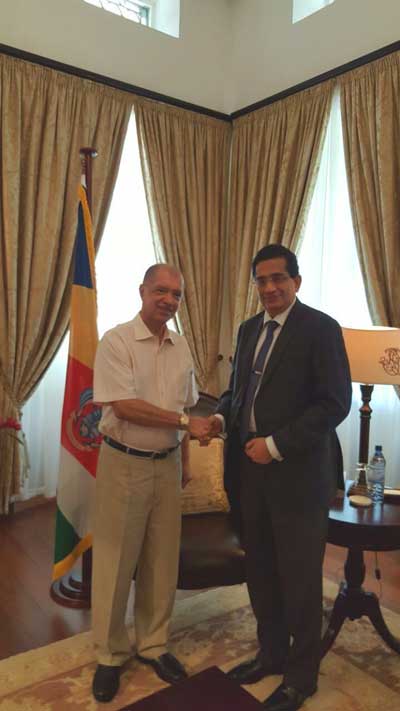Friday Feb 27, 2026
Friday Feb 27, 2026
Friday, 5 August 2016 00:00 - - {{hitsCtrl.values.hits}}
 Lanka Hospitals which recorded its highest ever profits in 2015, now looks to medical tourism to further enhance its profitability while consolidating its leadership in the local healthcare industry. Lanka Hospitals which has long pursued strategic partnerships within the region, is working with the Government of Seychelles to further strengthen its presence in that market. In this regard, Lanka Hospitals Chairman Dr. Sarath Paranavitane recently met with the President of Seychelles, James Michel.
Lanka Hospitals which recorded its highest ever profits in 2015, now looks to medical tourism to further enhance its profitability while consolidating its leadership in the local healthcare industry. Lanka Hospitals which has long pursued strategic partnerships within the region, is working with the Government of Seychelles to further strengthen its presence in that market. In this regard, Lanka Hospitals Chairman Dr. Sarath Paranavitane recently met with the President of Seychelles, James Michel.
The Management of Lanka Hospitals has long sought to provide its patients with truly world-class healthcare services. It has made prudent investments in expertise, technology, quality and cost controls to bring its services and facilities on par with the best in the world. This foresight on the part of the Board of Directors and the Management is now reaping rich dividends, and Lanka Hospitals is increasingly asserting itself as the healthcare provider of choice for patients in Sri Lanka and as well as within the region.
Said Dr. Paranavitane, “My meeting with the President of Seychelles reflects the increasing confidence that the international community places in the Lanka Hospitals brand. Our competitive edge lies in our consistent pursuit to provide the most up-to-date medical treatment and care for all our patients. In 2014 September we were awarded the very prestigious JCT accreditation. The extremely stringent criteria prescribed by the accreditation are the reason that less than 500 hospitals around the world have managed to achieve it, and we are very proud to be included in that exclusive group. Lanka Hospitals also boasts consistent success rates in complicated break through medical procedures as well regular treatments. All of this contributes to the high equity we enjoy among our patients and partners.”
Speaking on Lanka Hospitals’ growing presence in the region Dr. Paranavitane explained, “The Board and the Management of Lanka Hospitals have long recognised the potential in medical tourism. We have developed a structured plan to collaborate effectively with the newly formed Sri Lanka Medical Tourism Council functioning under the aegis of the Ministry of Tourism. We are also expanding our geographic horizons by reinforcing our partnerships with government and non-government organisations within the region. Hence my successful meeting with the President of Seychelles represents a huge milestone.”
Lanka Hospitals’ has established an International Patient Care Centre which is a dedicated, specialised unit designed to provide personalised services and the best in medical care for international patients who are far from home. The unit ensures that there is an appropriate interdisciplinary plan of action for each patient, seamless clinical logistics, a comprehensive patient and family education plan, and clear communication with the patient’s payers.
Lanka Hospitals is also aligning itself with world class norms by introducing a high degree of specialisation. The Women’s Wellness Centre, the Fertility Centre, Renal Care Centre, and the country’s first Gastroenterology Centre and Haemato-Oncology Centre are among the many specialised units which ensure that patients receive focussed and comprehensive end-to-end treatment, and the best medical expertise.
Going forward Lanka Hospitals will also focus on Geriatric Healthcare on another area of growth. Lanka Hospitals is harnessing its core competencies in patient care to meet the specific needs of this fast growing segment of Sri Lankan society.
Nursing is identified as a critical area and the plans are afoot to strengthen the Lanka Hospitals Nurses Training School (LHNTS). Recognising the high standards of training imparted at the School, the Maldivian government and the Maldives National University entered an agreement with LHNTS to train approximately 60 Maldivian student nurses each year. LHNTS is looking to increase its foreign student intake by initiating similar agreements with several other countries including Bangladesh, Myanmar and Seychelles.